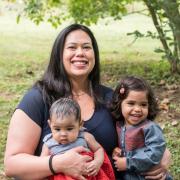
Weathering the Storm for Mothers and Babies: Hurricanes, Hispanic Heritage Month and Leading the Way Forward
It’s hard enough to watch. The daily barrage of shocking images of flood-ravaged homes, displaced families, chaotic shelters and stories of missing loved ones. It is heart wrenching as a viewer, which is absolutely no comparison to those who are living the experience of Hurricanes Harvey and Irma.
With natural disasters like Hurricanes Harvey and Irma, the after effects don’t end when the storm passes and the cameras stop rolling. As Dr. Jose Cordero, a researcher at the University of Georgia points out “Exposure to environmental contaminants, psychological stress, and lack of access to health care and medications during a disaster have potential serious consequences for pregnant women and infants” The impact will be felt for years, even after the flood waters disappear. The displacement and the rebuilding will continue for months—which places families under very extremely stressful circumstances.
This year, Hispanic Heritage Month begins during one of the deadliest hurricane seasons in recent history. Those storms have disproportionately hit black and brown populations including Puerto Rico, Cuba and cities such as Houston and Miami.
For example, in Miami-Dade County, Hispanic women account for 61% of all live births. That means there are a lot of mothers impacted--mothers who may be stressed about caring for or possibly being separated from their children. Pregnant or new moms may be anxious about medications, doctor visits, accessing healthy foods and or breastfeeding and for some of most vulnerable families there is the added burden of stress related to immigration status.
There is much to cause anxiety.
And while the trauma of the hurricanes will live on in minds of millions even after they have rebuilt, for pregnant women, the trauma is now embedded in their DNA and will impact the health outcomes of their yet unborn children for years to come.
Multiple studies prove that prenatal environmental exposures—including maternal psychological states can have sustained effects across the lifespan. And the stress of these natural disasters is palpable, a study of mother’s pre and post Hurricane Katrina found that distress before the hurricane, hurricane-related home damage, and exposure to traumatic events were associated with Post Traumatic Stress Syndrome that co-occurred with Psychological Distress. The prenatal period is a critical time for neurodevelopment and a mother’s stress levels can impact brain development and therefore behavioral health outcomes.
We all deal with some form of stress so often we don’t think about what stress really does or the potential damage prolonged or chronic stress can have on our health. Chronic stress takes a toll on our bodies but for women, and particularly pregnant women, the impact on their children is of great concern. Stress promotes inflammation, can impair your antibody response, slows wound healing, and suppresses cell-mediated immune function.
“Clinical tudies link pregnant women’s exposure to a range of traumatic, as well as chronic and common life stressors (i.e., bereavement, daily hassles, and earthquake), to significant alterations in children’s neurodevelopment, including increased risk for autism, affective disorders, and reduced cognitive ability,” according to a study in the Journal of Child Psychology and Psychiatry. We have long known that prenatal maternal stress is a key contributor to adverse birth outcomes particularly low birth weight.
Maternal antenatal anxiety and/or depression have been shown to predict increased risk for neuro-developmental disorders in children, and to confer risk for future mental illness. Reports show that elevated levels of antenatal depression and anxiety are associated with poor emotional adjustment in young children. In other studies, the impact of women’s anxiety (and/or depression) during pregnancy has been found to extend into childhood and adolescence. The science is hard to ignore.
Yes, the impacts of Harvey and Irma (and future storms) on expecting mothers will take years to fully understand. Therefore, when it comes to maternal and child health outcomes, the hurricane recovery efforts we must engage in must go beyond monetary donations, food supplies and clothing.
It will require rallying our empathy and compassion to create a social buffer to mitigate the damaging effects of chronic stress. It will mean community-built solutions to support expecting and new moms and their children with social support and increased health and educational resources.
As Hispanic Heritage Month kicks off we're focusing on the role self-determination and home-grown leaders play in shifting our health outcomes and empowering our communities. Our theme “Yo dirijo. Y crecemos" or "I lead. We grow,” speaks to our ability to play an active role in our lives, families and communities, even in these uncertain times.
We cannot forget about the mothers and children, even those yet unborn, who are being impacted by the stress of Harvey and Irma that will continue to be forever changed by these unprecedented disasters. Chronic stress is already a regular occurrence for our communities and exists in the forms of racism, sexism, and xenophobia both on the individual and structural level--natural disasters merely amplify the presence of social inequalities. As we work to support all families to improve Latino health outcomes, we cannot let the changing news cycle allow us to lose sight on the damage done to mothers and children that may never recede or dry up.
At Urban Strategies, this is our work.
And we, for our part, will not forget.



The views and opinions expressed in this post are those of the author(s) and do not necessarily reflect those of MomsRising.org.
MomsRising.org strongly encourages our readers to post comments in response to blog posts. We value diversity of opinions and perspectives. Our goals for this space are to be educational, thought-provoking, and respectful. So we actively moderate comments and we reserve the right to edit or remove comments that undermine these goals. Thanks!